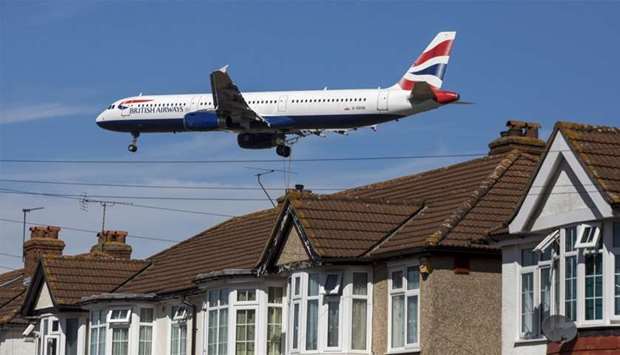Climate change is now a sad reality — the world is already 1.1°C warmer than it was at the onset of the industrial revolution, and it is already having a significant impact on the world, and on people’s lives.
And if current trends persist, experts warn the global temperatures can be expected to rise by 3.2 to 3.9°C this century, which would bring wide-ranging and destructive climate impacts.
This was the message that was sent by the UN Climate Change Conference (COP 25) that concluded in Madrid recently.
Air transport accounts for 2% of global man-made CO2 emissions. In 2017, civil aviation, as a whole, emitted around 859mn tonnes of CO2, which is roughly 2% of man-made carbon emissions.
It is estimated that, under the industry’s trend setting initiative CORSIA or Carbon Offsetting and Reduction Scheme for International Aviation, a global carbon offsetting scheme, aviation will have to offset 2.6bn tonnes of CO2 between 2021 and 2035.
The UN Environment Programme (UNEP) has warned, in its 2019 Emissions Gap Report, that greenhouse gas emissions reductions of 7.6% a year from 2020 to 2030 are needed to meet the internationally agreed goal of a 1.5°C increase in temperatures over pre-industrial level.
Therefore, the aviation industry will have to play a significant role in helping achieve the global target set to cap carbon emissions.
In a recent report presented at its Global Media Day in Geneva, the International Air Transport Association (IATA) said carbon emissions per passenger have declined by more than 50% since 1990.
Much of the improvement has occurred because the industry has achieved an annual fuel efficiency improvement of 2.3% over the period since 2009, some 0.8 percentage points ahead of target.
This progress is a combination of investments in more efficient aircraft and operational efficiencies.
Airlines have invested some $1tn in new aircraft since 2009, and in addition have signed forward purchase agreements for sustainable aviation fuel (SAF) amounting to approximately $6 billion. In addition, the introduction of CORSIA will ensure carbon-neutral growth on international flights from 2020 and raise around $40bn in climate finance.
An IATA analysis shows that efforts to deliberately suppress air travel through punitive passenger taxes are inefficient and largely ineffective at reducing carbon.
The CORSIA scheme's effectiveness lies in its global scope. It is estimated it will reduce emissions by around 2.5bn tonnes over the lifetime of the scheme. But global goodwill towards implementing CORSIA is being compromised by governments introducing a patchwork of carbon taxes.
A series of decisions or proposals have been made in recent months to levy air passenger taxes, including in France, Germany, the Netherlands and Switzerland.
"Taxation aimed at stopping people from exercising their freedom to fly will make travel more expensive but do very little to reduce emissions. It is a politician's feel-good solution, without taking responsibility for the negative impact it has on the economy or the mobility restrictions it imposes on people with lower incomes," said Alexandre de Juniac, IATA's Director General and CEO.
He said, "Cutting per passenger emissions in half is an amazing achievement of the technical expertise and innovation in the aviation industry. But we have even bigger ambitions. From 2020 we will cap net emissions. And by 2050 we will cut emissions to half 2005 levels. Accomplishing these targets means continued investment in new technology, sustainable fuels, and operational improvements."
A joint report by Climate Action Network (CAN) and International Coalition for Sustainable Aviation (ICSA) said the aviation sector is a top-ten global emitter whose emissions are expected to rise dramatically by mid-century.
Under current scenarios, the aviation sector could emit 56 GtCO2 over the period 2016-2050, or one-quarter of the remaining carbon budget.
It is critical that the global aviation sector contribute its fair share towards achieving a 1.5°C future.
Aviation, therefore, needs to immediately start to reduce its in-sector emissions, then rapidly reduce its emissions and fully de-carbonise toward the second half of this century.
In addition to the sector’s CO2 emissions, aviation’s non-CO2 effects need to be addressed, the report said and noted aviation emissions are 2.1% of the global share, but when non-CO2 effects are included, aviation contributes an estimated 4.9% to the global warming problem.
Hence, the global aviation sector must have both zero CO2 emissions and zero non-CO2 effects on the climate by the end of the century.
Experts say the industry favours a single, global market-based measure to address CO2 emissions from international aviation. Many airlines fly into dozens of different countries on a daily basis, with some large airlines serving over a hundred different countries each day; they need to have a single point of accountability.
If airlines are subject to a patchwork of national or regional CO2 taxes, offsetting mechanisms, emissions trading schemes and other carbon pricing instruments, compliance would be unnecessarily complex and costly, they argue.
Long-term, aviation is certainly aiming to reduce emissions with cleaner technology.
But this will require a financially sound airline sector capable of funding the significant investments that will be needed to make flying sustainable.
*Pratap John is Business Editor at Gulf Times.


